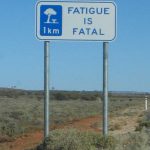EMS providers across the country are assigned to a variety of schedules, ranging from shift work to continuous 24 hour service. Overnight duty, rotating schedules, early awakening and sleep interruptions are common. Unfortunately, there are not many studies on the effects of fatigue on EMS. I did manage to find an interesting study from last year that I’d like to share.
A group of about 3,000 providers attending a national conference were surveyed using 2 test instruments (Pittsburgh Sleep Quality Index (PSQI) and Chalder Fatigue Questionnaire (CFQ)). The PSQI measures subjective sleep quality, sleep duration, disturbances, use of sleeping meds and daytime dysfunction. The CFQ measures both physical and mental fatigue.
Only 119 surveys were completed, despite the fact that a $5 gift card was offered (not enough?). The most common certification was EMT-Basic (63%) and most had worked less than 10 years. Most were full-time, with most working 4-15 shifts per month. The following demographics were of interest:
- Self-reported good health – 70%
- Nonsmokers – 85%
- Moderate alcohol or less – 62%
- Overweight or obese – 85%
A total of 45% reported experiencing severe physical and mental fatigue at work, and this increased with years of experience. The sleep quality score confirmed this fact. Also of interest was the incidental finding of a high proportion of overweight or obese individuals. Sleep deprivation is known to increase weight, and increased weight is known to increase sleep problems, creating a vicious cycle.
Bottom line: This is a small convenience study, but it was enough to show that there is a problem with fatigue and sleep quality in EMS providers. Federal law mandates rest periods for pilots, truck drivers and tanker ship personnel. The accrediting body for resident physicians has guidelines in place that limit their time in the hospital. Prehospital providers perform a service that is just as vital, so it may be time to start looking at a more reasonable set of scheduling and work guidelines to protect them and their precious cargo.
Reference: Sleep quality and fatigue among prehospital providers. Prehos Emerg Care 14(2):187-193, April 6, 2010.

